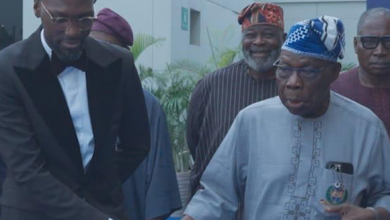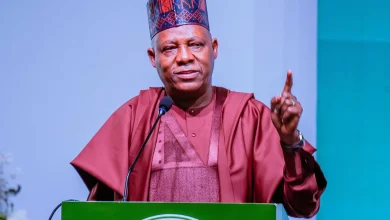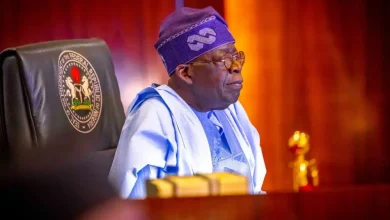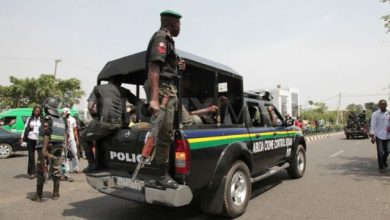Raila odinga laid to rest in state burial attended by thousands
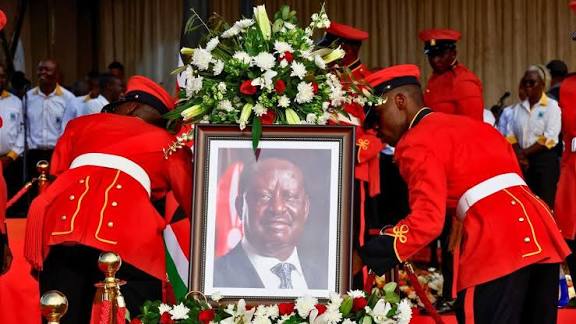
Former Kenyan Prime Minister and long-time opposition leader Raila Odinga was laid to rest on Sunday, October 19, 2025, in his hometown of Bondo, in western Kenya.
The burial followed a series of national commemorations and a week of public mourning, culminating in a rare state funeral for a politician who, though he never served as president, remained one of the most influential figures in the country’s political history.
Odinga died on Wednesday at the age of 80 in India, where he had been receiving medical treatment.
His death triggered a national outpouring of grief, reflecting the depth of his influence over decades of public service, political resistance, and democratic reform.
Born into a political family and son of Kenya’s first Vice President Jaramogi Oginga Odinga, Raila spent much of his life at the center of Kenyan politics, often at odds with ruling powers.
He was detained multiple times during the autocratic era of President Daniel arap Moi, spending years in jail and exile for his role in agitating for democratic reforms.
The funeral, held under tight security, was attended by tens of thousands who made the journey to Bondo.
Many had travelled long distances, some on foot, to witness the burial of the man they affectionately called “Baba,” Swahili for “father.”
The day’s events began with a state funeral ceremony at the Jaramogi Oginga Odinga University, named after Raila’s father.
The grounds were packed with mourners waving flags, holding flowers, and chanting slogans that echoed the political messages Odinga had championed during his life.
Military officers performed ceremonial honors, with uniformed pallbearers standing in formation as they accompanied the coffin draped in the Kenyan national flag.
A military band played the Last Post, and trumpeters marked the solemn moments as the casket was carried to its final resting place.
The crowd occasionally broke into chants of “Jowi,” a Dholuo war cry signifying strength and valor, and “Baba,” his most enduring nickname among his supporters.
Despite tensions earlier in the week during nationwide memorials, which had resulted in the deaths of at least five people in Nairobi, three from police gunfire during a stadium event and two from a stampede, the funeral itself proceeded without major incident.
Security forces maintained strict control over the area, and access to the burial site was heavily monitored.
One emotional scene unfolded when some mourners broke through security barriers and climbed atop the Jaramogi Oginga Odinga Mausoleum.
This action, though initially perceived as a breach, was seen by many as a cultural and symbolic gesture.
Mourners claimed their presence at the gravesite was necessary for closure.
Grace Auma Lubale, a 40-year-old woman from Kisumu, told AFP that it was a deeply personal and spiritual act.
“According to our customs, we had to make sure we stepped on the soil where he will be laid to rest so that our hearts may be contented,” she said. “And we’ll miss him, but his legacy will remain in us.”
President William Ruto, who had only recently entered into a political alliance with Odinga, attended the funeral and described the moment as a significant loss for the nation.
In his address, he praised Odinga’s enduring commitment to national dialogue and reconciliation, despite years of being an opposition figure.
Former Nigerian President Olusegun Obasanjo, who had long-standing ties with Odinga and Kenya, was also present and paid tribute during the ceremony.
Raila Odinga’s political career spanned more than four decades.
He served as a Member of Parliament, Minister of Energy, and Minister for Roads, before eventually being appointed Prime Minister in 2008 as part of a power-sharing agreement following Kenya’s disputed 2007 elections.
That agreement ended months of post-election violence in which over 1,000 people were killed and hundreds of thousands displaced.
He held the prime ministerial post until 2013. Over the course of his career, Odinga contested five presidential elections in 1997, 2007, 2013, 2017, and 2022, each time galvanizing large swathes of the electorate, particularly in western Kenya, Nairobi, and the coastal regions.
Though he never ascended to the presidency, he is credited with helping to usher in Kenya’s 2010 constitution, which significantly reshaped the country’s governance and decentralisation framework.
Odinga was also instrumental in building coalitions that brought together diverse ethnic and political constituencies, even as he frequently found himself in bitter opposition to the sitting government.
Odinga’s resilience and symbolic importance to the country’s reformist and democratic movements earned him a place of reverence, especially among Kenya’s youth and marginalized communities.
His critics accused him of being a perennial candidate who never quite made the transition from opposition to national leadership, but few disputed his influence.
Sunday’s burial marked the first time a Kenyan received a state funeral without having served as head of state.
The move was widely interpreted as a recognition of his role in shaping modern Kenyan politics.
Floral arrangements were laid beside his coffin, some bearing the word “Baba,” and others bearing personal messages from supporters, dignitaries, and family.
Erick Saunda, a 37-year-old teacher from Kisumu, stood among the crowd with tears in his eyes.
“Nobody appointed him as a kingpin he proved himself to be a kingpin,” he said. “Baba is still in our hearts. No one can replace him as we speak. Even in the grave, he will still remain our hero.”
Odinga’s family did not release a detailed medical report on the cause of his death, but sources indicated he had been battling health issues in recent months.
His body was flown back to Kenya on Thursday, followed by three days of official mourning, including public viewings and tributes across the country.
In a nation where political divisions run deep, Odinga’s funeral offered a rare moment of unity.
It brought together figures from across the political spectrum, including former adversaries, who spoke not of past rivalries, but of the legacy of a man they said had sacrificed personal ambition for national progress.
As the sun set over the hills of Bondo and the final prayers were recited, Kenya bid farewell to a man whose name had become synonymous with resilience, reform, and resistance.
The silence that followed the lowering of the casket spoke louder than words. The struggle he had waged for justice and equality may be over, but his imprint on the country’s conscience remains indelible.
